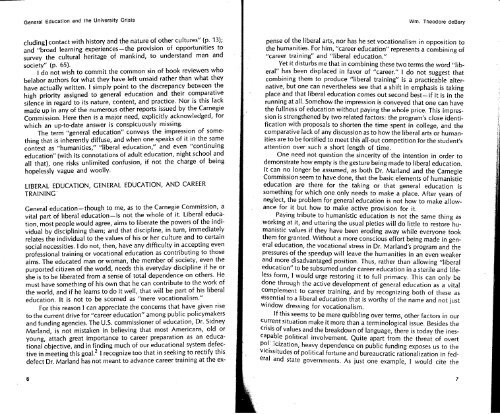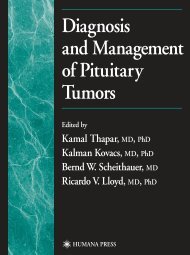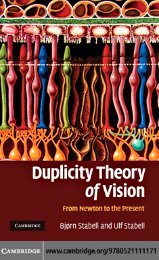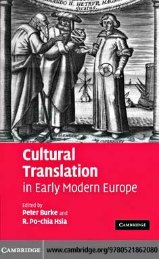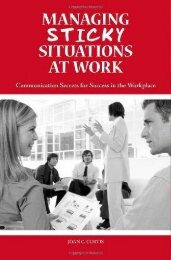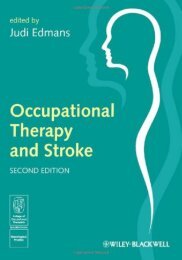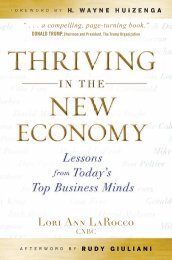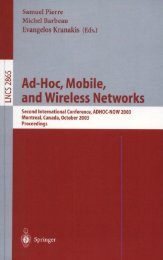<strong>General</strong> Education and <strong>the</strong> University CrisisWrn. <strong>The</strong>odore deBarycluding] contact with history and <strong>the</strong> nature <strong>of</strong> o<strong>the</strong>r cultures" (p. 13);and "broad learning experiences-<strong>the</strong> provision <strong>of</strong> opportunities tosurvey <strong>the</strong> cultural heritage <strong>of</strong> mankind, to understand man andsocietyM (p. 65).I do not wish to commit <strong>the</strong> common sin <strong>of</strong> book reviewers whobelabor authors <strong>for</strong> what <strong>the</strong>y have left unsaid ra<strong>the</strong>r than what <strong>the</strong>yhave actually written. I simply point to <strong>the</strong> discrepancy between <strong>the</strong>high priority assigned to general education and <strong>the</strong>ir comparativesilence in regard to its nature, content, and practice. Nor is this lackmade up in any <strong>of</strong> <strong>the</strong> numerous o<strong>the</strong>r reports issued by <strong>the</strong> CarnegieCommission. Here <strong>the</strong>n is a major need, explicitly acknowledged, <strong>for</strong>which an up-to-date answer is conspicuously missing.<strong>The</strong> term "general education" conveys <strong>the</strong> impression <strong>of</strong> somethingthat is inherently diffuse, and when one speaks <strong>of</strong> it in <strong>the</strong> samecontext as "humanities," "liberal education," and even "continuingeducation" (with its connotations <strong>of</strong> adult education, night school andall that), one risks unlimited confusion, if not <strong>the</strong> charge <strong>of</strong> beinghopelessly vague and woolly.LIBERAL EDUCATION, GENERAL EDUCATION, AND CAREERTRAINING'<strong>General</strong> education-though to me, as to <strong>the</strong> Carnegie Commission, avital part <strong>of</strong> liberal education-is not <strong>the</strong> whole <strong>of</strong> it. Liberal education,most people would agree, aims to liberate <strong>the</strong> powers <strong>of</strong> <strong>the</strong> individualby disciplining <strong>the</strong>m; and that discipline, in turn, immediatelyrelates <strong>the</strong> individual to <strong>the</strong> values <strong>of</strong> his or her culture and to certainsocial necessities. I do not, <strong>the</strong>n, have any difficulty in accepting evenpr<strong>of</strong>essional training or vocational education as contributing to thoseaims. <strong>The</strong> educated man or woman, <strong>the</strong> member <strong>of</strong> society, even <strong>the</strong>purported citizen <strong>of</strong> <strong>the</strong> world, needs this everyday discipline if he orshe is to be liberated from a sense <strong>of</strong> total dependence on o<strong>the</strong>rs. Hemust have something <strong>of</strong> his own that he can contribute to <strong>the</strong> work <strong>of</strong><strong>the</strong> world, and if he learns to do it well, that will be part <strong>of</strong> his liberaleducation. It is not to be scorned as "mere vocationalism."For this reason I can appreciate <strong>the</strong> concerns that have given riseto <strong>the</strong> current drive <strong>for</strong> "career education" among public policymakersand funding agencies. <strong>The</strong> US. commissioner <strong>of</strong> education, Dr. SidneyMarland, is not mistaken in believing that most Americans, old oryoung, attach great importance to career preparation as an educationalobjective, and in finding much <strong>of</strong> our educational system defectivein meeting this goal.2 I recognize too that in seeking to rectify thisdefect Dr. Marland has not meant to advance career training at <strong>the</strong> ex-pense <strong>of</strong> <strong>the</strong> liberal arts, nor has he set vocationalism in opposition to<strong>the</strong> humanities. For him, "career education" represents a combining <strong>of</strong>"career training" and "liberal education."Yet it disturbs me that in combining <strong>the</strong>se two terms <strong>the</strong> word "liberal"has been displaced in favor <strong>of</strong> "career." I do not suggest thatcombining <strong>the</strong>m to produce "liberal training" is a practicable alternative,but one can never<strong>the</strong>less see that a shift in emphasis is takingplace and that liberal education comes out second best-if it is in <strong>the</strong>running at all. Somehow <strong>the</strong> impression is conveyed that one can have<strong>the</strong> fullness <strong>of</strong> education without paying <strong>the</strong> whole price. This impressionis streng<strong>the</strong>ned by two related factors: <strong>the</strong> program's close identificationwith proposals to shorten <strong>the</strong> time spent in college, and <strong>the</strong>comparative lack <strong>of</strong> any discussion as to how <strong>the</strong> liberal arts or humanitiesare to be <strong>for</strong>tified to meet this all-out competition <strong>for</strong> <strong>the</strong> student'sattention over such a short length <strong>of</strong> time.One need not question <strong>the</strong> sincerity <strong>of</strong> <strong>the</strong> intention in order todemonstrate how empty is <strong>the</strong> gesture being made to liberal education.It can no longer be assumed, as both Dr. Marland and <strong>the</strong> CarnegieCommission seem to have done, that <strong>the</strong> basic elements <strong>of</strong> humanisticeducation are <strong>the</strong>re <strong>for</strong> <strong>the</strong> taking or that general education issomething <strong>for</strong> which one only needs to make a place. After years <strong>of</strong>neglect, <strong>the</strong> problem <strong>for</strong> general education is not how to make allowance<strong>for</strong> it but how to make active provision <strong>for</strong> it.Paying tribute to humanistic education is not <strong>the</strong> same thing asworking at it, and uttering <strong>the</strong> usual pieties will do little to restore humanisticvalues if <strong>the</strong>y have been eroding away while everyone took<strong>the</strong>m <strong>for</strong> granted. Without a more conscious ef<strong>for</strong>t being made in generaleducation, <strong>the</strong> vocational stress in Dr. Marland's program and <strong>the</strong>pressures <strong>of</strong> <strong>the</strong> speedup will leave <strong>the</strong> humanities in an even weakerand more disadvantaged position. Thus, ra<strong>the</strong>r than allowing "liberaleducation" to be subsumed under career education in a sterile and lifeless<strong>for</strong>m, I would urge restoring it to full primacy. This can only bedone through <strong>the</strong> active development <strong>of</strong> general education as a vitalcomplement to career training, and by recognizing both <strong>of</strong> <strong>the</strong>se asessential to a liberal education that is worthy <strong>of</strong> <strong>the</strong> name and not justwindow dressing <strong>for</strong> vocationalism.If this seems to be mere quibbling over terms, o<strong>the</strong>r factors in ourcurrent situation make it more than a terminological issue. Besides <strong>the</strong>crisis <strong>of</strong> values and <strong>the</strong> breakdown <strong>of</strong> language, <strong>the</strong>re is today <strong>the</strong> inescapablepolitical involvement. Quite apart from <strong>the</strong> threat <strong>of</strong> overtpol' icization, heavy dependence on public funding exposes us to <strong>the</strong>vicissitudes <strong>of</strong> political <strong>for</strong>tune and bureaucratic rationalization in federaland state governments. As just one example, I would cite <strong>the</strong>
<strong>General</strong> Education and <strong>the</strong> University CrisisWm. <strong>The</strong>odore deBaryappealing idea that much <strong>of</strong> a college education can be achieved byexamination, which has won powerful support from public agencies <strong>for</strong>external degree programs. Though unexceptionable as an adjunct topersonal participation in a regular college program, this devicebecomes a threat to liberal education when <strong>the</strong> university is made t<strong>of</strong>unction largely as an external examining and degree-granting institution;it ignores <strong>the</strong> baneful effects <strong>of</strong> such a system in Europe and Asia,where <strong>the</strong> routinization <strong>of</strong> study and examination has produced a largeclass <strong>of</strong> students having little contact with teachers, sharing almostnone <strong>of</strong> <strong>the</strong> values <strong>of</strong> university life or a common culture, and at <strong>the</strong>rnercv ...- .-, <strong>of</strong> . reva ailing ideologies <strong>for</strong> some unified approach to an understandingbf <strong>the</strong> world in which <strong>the</strong>y live.We are, <strong>the</strong>n, in a dynamic situation, a time <strong>of</strong> pervasive flux, inwhich powerful <strong>for</strong>ces operate on us willy-nilly and nothing <strong>of</strong> educationalvalue can survive just by being left to itself. For this reason, too,liberal education is unlikely to be sustained if vocationalism is given apowerful <strong>for</strong>ward thrust by means <strong>of</strong> public funding and if no countervailing<strong>for</strong>ce is exerted in behalf <strong>of</strong> general education.Despite what I have said in behalf <strong>of</strong> both liberal and generaleducation, <strong>the</strong>re are some who will be made uneasy by my willingnessto accept career training as a part <strong>of</strong> liberal education and especiallyby my readiness to begin it in <strong>the</strong> undergraduate years. It will seem thatI have made a fatal compromise in only slightly different terms fromthose <strong>of</strong> Dr. Marland. To deal with this question, I must first makesome important distinctions.I conceive <strong>of</strong> liberal education as a lifelong involvement and reject<strong>the</strong> earlier idea that it is a phase <strong>of</strong> general broadening in <strong>the</strong> earlyyears <strong>of</strong> college, followed by increasing specialization. Specializationis inescapable, but so too should general education be accepted as anindispensable continuing process. Thus we come to <strong>the</strong> notion <strong>of</strong> liberaleducation as lifelong learning that, both early and late, combines<strong>the</strong> concurrent and complementary activities <strong>of</strong> general education andcareer specialization.It will be equally evident, however, that this process must allow<strong>for</strong> development and maturation. Each individual will experience agradual deepening <strong>of</strong> both throughout life, but likewise, in <strong>the</strong> earlystages, adaptations will need to be made in regard to what is appropriate<strong>for</strong> each person at each level. I shall discuss later what wouldbe appropriate <strong>for</strong>ms <strong>of</strong> general education at several levels. Here Ineed only make a distinction between disciplinary training and vocationaltraining. <strong>The</strong> one should lead into <strong>the</strong> o<strong>the</strong>r, and in <strong>the</strong> undergraduateyears career preparation should first take <strong>the</strong> <strong>for</strong>m <strong>of</strong> trainingin those basic disciplines that will be essential tools in one's later work.Some students will master <strong>the</strong>se sooner than o<strong>the</strong>rs, and if <strong>the</strong>y do so,in my opinion <strong>the</strong>re is no reason why <strong>the</strong>y should not move ahead asrapidly as possible toward <strong>the</strong> highest necessary degree <strong>of</strong> career specialization.<strong>The</strong>re is no doubt in my mind that <strong>the</strong> attainment <strong>of</strong> suchcompetence is a powerful liberating experience <strong>for</strong> almost anyone.<strong>The</strong> danger in it comes only when this is done at <strong>the</strong> expense <strong>of</strong>one's general education, so that <strong>the</strong> achievement <strong>of</strong> specialized competenceproduces undue intellectual narrowing and isolation. In <strong>the</strong>best <strong>of</strong> circumstances, <strong>the</strong> more independent and original <strong>of</strong> scholarswill find <strong>the</strong>mselves working largely alone on <strong>the</strong>ir own problems, but<strong>the</strong> degree <strong>of</strong> one's isolation will depend on participation in a largercommunity <strong>of</strong> discourse to which <strong>the</strong>y have access through <strong>the</strong>ir continuinggeneral education. For most students a proper balance can beachieved by not allowing specialization to proceed more rapidly incollege than is consistent with <strong>the</strong> need <strong>for</strong> general education and bystressing training in fundamental disciplines, ra<strong>the</strong>r than specializedresearch, as career preparation on <strong>the</strong> undergraduate level.All this seems no more than obvious, but it bears repeating. Some<strong>of</strong> <strong>the</strong> most obvious truths in education are ones that tend to be disregardedwhen general education and career training become pittedagainst one ano<strong>the</strong>r as irreconcilable interests. Those who wish to getahead with career education regret <strong>the</strong> loss <strong>of</strong> time spent in generaleducation, which to <strong>the</strong>m is <strong>of</strong> dubious practical value. Those whostruggle to preserve liberal values feel threatened by any suggestionthat <strong>the</strong> student should move ahead faster toward specialization in <strong>the</strong>early years <strong>of</strong> college. Yet it is well known that many disciplines arebest learned in one's early years and that it is possible to master <strong>the</strong>mwithout sacrificing all else, if <strong>the</strong>re is a maximum <strong>of</strong> flexiblecoordination.We know, <strong>for</strong> instance, that much can and should be done in respectto language learning. Americans are notoriously backward incomparison to most o<strong>the</strong>r people in <strong>the</strong>ir mastery <strong>of</strong> <strong>for</strong>eign languages.At <strong>the</strong> same time, however, we have developed probably <strong>the</strong> finestIinstructional methods in <strong>the</strong> world <strong>for</strong> rapid language learning. It hasalso been established beyond question that language learning is bestdone in <strong>the</strong> early years. Here, <strong>the</strong>n, we have an example <strong>of</strong> a specificdiscipline that should be learned earlier ra<strong>the</strong>r than later in <strong>the</strong> educa- i;tional process, that should not be sacrificed ei<strong>the</strong>r to general educationor specialized training, but that should, if properly managed, contributeto both <strong>of</strong> <strong>the</strong>se and thus enhance one's liberal education.
- Page 1 and 2: THEOther books published in coopera
- Page 3 and 4: ContentsIntroductionSidney HookxiGE
- Page 5 and 6: IntroductionSidney HookNew York Uni
- Page 7 and 8: GENERAL EDUCATION -CHALLENGEAND JUS
- Page 9: General Education and the Universit
- Page 13 and 14: General Education and the Universit
- Page 15 and 16: General Education and the Universit
- Page 17 and 18: General Education and the Universit
- Page 19 and 20: General Education and the Universit
- Page 21 and 22: General Education: The Minimum Indi
- Page 23 and 24: General Education: The Minimum Indi
- Page 25 and 26: General Education: The Minimum Indi
- Page 27 and 28: On Reviving Liberal Education-inthe
- Page 29 and 30: On Reviving Liberal Education-in th
- Page 31 and 32: On Reviving Liberal Education-inthe
- Page 33 and 34: Humanism and the HumanitiesFrederic
- Page 35 and 36: Humanism and the HumanitiesFrederic
- Page 37 and 38: Humanism and the HumanitiesFrederic
- Page 39 and 40: Humanism and the HumanitiesFrederic
- Page 41 and 42: Humanism and the HumanitiesFrederic
- Page 43 and 44: Humanism and the HumanitiesFrederic
- Page 45 and 46: Justifying the HumanitiesRonald Ber
- Page 47 and 48: Observations on Humanism and Histor
- Page 49 and 50: Observations on Humanism and Histor
- Page 51 and 52: The Language and Methods of Humanis
- Page 53 and 54: The Language and Methods of Humanis
- Page 55 and 56: The Language and Methods of Humanis
- Page 57 and 58: Science, Science Teaching, and Rati
- Page 59 and 60: Science, Science Teaching, and Rati
- Page 61 and 62:
Science, Science Teaching, and Rati
- Page 63 and 64:
Science, Science Teaching, and Rati
- Page 65 and 66:
Science, Science Teaching, and Rati
- Page 67 and 68:
In Defense of Scientific Knowledgei
- Page 69 and 70:
In Defense of Scientific KnowledgeE
- Page 71 and 72:
The Uses and Limitations of Science
- Page 73 and 74:
The Uses and Limitations of Science
- Page 75 and 76:
The Uses and Limitations of Science
- Page 77 and 78:
Multilevel Teaching of the Natural
- Page 79 and 80:
The Social Sciences in Liberal Educ
- Page 81 and 82:
The Social Sciences in Liberal Educ
- Page 83 and 84:
The Social Sciences in Liberal Educ
- Page 85 and 86:
The Social Sciences in Liberal Educ
- Page 87 and 88:
The Economist Among the Social Scie
- Page 89 and 90:
The Economist Among the Social Scie
- Page 91 and 92:
Social Science and General Educatio
- Page 93 and 94:
A Role for Social Science?Robert L.
- Page 95 and 96:
Experiential Educationand Revitaliz
- Page 97 and 98:
Experiential Education and Revitali
- Page 99 and 100:
Experiential Education and Revitali
- Page 101 and 102:
Experiential Education and Revitali
- Page 103 and 104:
Experiential Education and Revitali
- Page 105 and 106:
Experiential Education and Revitali
- Page 107 and 108:
Education for the Future: The Liber
- Page 109 and 110:
Education for the Future: The Liber
- Page 111 and 112:
The Desirability of Pulling in One'
- Page 113 and 114:
On Sharpening the HornsSidney Hooki
- Page 115 and 116:
~ The Humanities as Scholarshipand
- Page 117 and 118:
The Humanities as Scholarship and a
- Page 119 and 120:
Questions of Viability in Nontradit
- Page 121 and 122:
On Interdisciplinary EducationHowar
- Page 123 and 124:
On Interdisciplinary EducationHowar
- Page 125 and 126:
The Logic of the Social Sciences: T
- Page 127 and 128:
The Logic of the Social Sciences: T
- Page 129 and 130:
The Logic of the Social Sciences: T
- Page 131 and 132:
A Pro~osal for a New Division of th
- Page 133 and 134:
A Proposal for a New Division of th
- Page 135 and 136:
New Beginnings in General Education
- Page 137 and 138:
Thoughts on a Social-Science Curric
- Page 139 and 140:
Thoughts on a Social-Science Curric
- Page 141 and 142:
Thoughts on a Social-Science Curric
- Page 143 and 144:
Thoughts on a Social-Science Curric
- Page 145 and 146:
The Specter at the Feastevaluated.
- Page 147:
ContributorsContributorsLearned Soc


